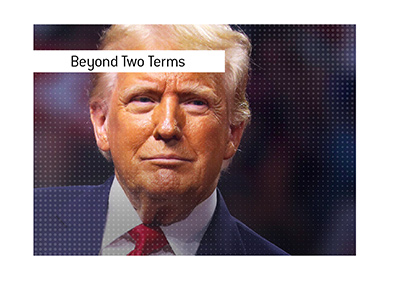The Two Avenues That President Donald Could Pursue To Remain in the White House
 President Donald Trump recently teased that he could "perhaps" pursue a third Presidential term in 2028.
President Donald Trump recently teased that he could "perhaps" pursue a third Presidential term in 2028. As it stands right now, President Trump is barred from seeking a third term as President. This is due to the 22nd Amendment, which was ratified and included as part of the Constitution on March 1st, 1951. This Amendment limits Presidents to two terms in the White House.
When the Founding Fathers were crafting the United States Constitution, they argued over whether or not there should be term limits.
Some of the Founding Fathers supported lifetime Presidential appointments, while others wanted term limits.
In the end, the original Constitution stated that there would be four-year terms for the President but there would be no limit to the number of terms they could win.
A number of Presidents - President Jefferson, President Grant, and President Theodore Roosevelt - toyed with the idea of running for a third term, though none decided to pursue it.
It's important to note that for nearly 200 years, the United States had no term limits.
Things changed when President Franklin D. Roosevelt came along.
FDR won in 1932, 1936, 1940 and 1944. When he won in 1944, Roosevelt was in extremely poor health, and even many Democrats didn't want him to run for re-election. Despite that, FDR won easily, though he would pass away just three months after his inauguration.
After taking control of both the House and Senate, the Republicans passed bills to limit Presidents to just two terms.
Now came the hard part - 75% of state legislatures had to approve the amendment as well, per the terms of the Constitution.
This process started in March of 1947 and took roughly four years to complete.
In order to run for a third term as President, the 22nd Amendment would have to be repealed. If this Amendment was repealed, President Trump could run for a third term in 2028.
In order to appeal the 22nd Amendment, the proposed Amendment would first have to pass BOTH the House and Senate with two-thirds support. After that, 75% of the states would have to agree to the proposed Amendment as well.
There is virtually ZERO chance that the Democrats would offer up enough support to repeal the 22nd Amendment.
It should be mentioned that the Democrats have put forth bills to remove the two-term limit a number of times in the past. A fairly popular President in his second term while usually result in his party putting forth a proposal to repeal the 22nd Amendment - both sides are on the same team in this regard.
Likelihood: Extremely unlikely.
-
There is another unlikely avenue that could see President Trump remain in the White House in 2028.
Constitutional lawyers and scholars disagree on whether this would even be a possibility for President Trump.
Some believe that President Trump could run for Vice President (Vance/Trump) in 2028.
Here is an excerpt from our article titled "Could Donald Trump Run For Vice President in 2028?":
'"The disagreement over the possibility of Donald Trump serving as Vice President in 2028 comes down to three clauses:
1. Article II, Section I, Clause 5 of the original Constitution which lays out the eligibility to serve as President
2. The 12th Amendment, which includes the line: "No person constitutionally ineligible to the office of President shall be eligible to that of Vice-President of the United States".
3. The 22nd Amendment, which contains the line: "No person shall be elected to the office of the President more than twice, and no person who has held the office of President, or acted as President, for more than two years of a term to which some other person was elected President shall be elected to the office of President more than once".
For the people who DON'T think that a two-term President can serve as Vice President, the argument is fairly simple: the 22nd Amendment makes them ineligible to serve as President, and therefore they can't serve as Vice President either, based on Article II, Section I, Clause 5 of the Constitution.
But hold up, the other side says - they are still constitutionally eligible to serve as President based on the original Constitution. Here are the criteria to be considered constitutionally eligible:
"No person except a natural born Citizen, or a Citizen of the United States, at the time of the adoption of this Constitution, shall be eligible to the Office of President; neither shall any person be eligible to that Office who shall not have attained to the Age of thirty five Years, and been fourteen Years a Resident within the United States."
The 22nd Amendment, they point out, doesn't specifically mention the Vice Presidency, only the Presidency:
"No person shall be elected to the office of the President more than twice, and no person who has held the office of President, or acted as President, for more than two years of a term to which some other person was elected President shall be elected to the office of the President more than once. But this Article shall not apply to any person holding the office of President when this Article was proposed by the Congress, and shall not prevent any person who may be holding the office of President, or acting as President, during the term within which this Article becomes operative from holding the office of President or acting as President during the remainder of such term."'
-
Again - BOTH parties have mused about this possibility in the past.
Dwight Eisenhower said that he was considering running for Vice President in both 1960 and 1964.
In 2016, there was talk about a Hillary Clinton/Bill Clinton ticket - Democrats loved the idea, while Republicans seethed over the possibility.
Again, this possibility seems unlikely - President Trump serving as Vice President? With the Republicans holding control of the Supreme Court, however, anything is possible, and there are some who believe that President Trump would be able to serve as a Vice President.
-
These are the two scenarios that could see President Trump remain in the White House in 2028 and beyond.
Filed under: General Knowledge



